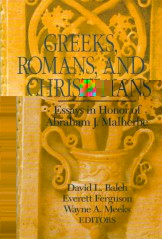|
|
Classic Reprints and Out-of-Print |
|
Reprint Spotlight: The Life of Jesus Jesus'
Proclamation of
- Select new &
used Contact Information:
More detailed information may be found in the Order Information section. |
Greeks, Romans, and Christians:
Essays in Honor of Abraham Malherbe
Edited by David L. Balch, Everett Ferguson, Wayne A. Meeks
 |
List Price: Cloth - 400 pp |
|
Contents 1. Heracles and Christ: Heracles Imagery in the Christology of Early
Christianity 2. A Dog in the Manger: The Cynic Cynulcus among Athenaeus's
Deipnosophists 3. Stoics and Early Christians on Blessedness 4. The Areopagus Speech: An Appeal to the Stoic Historian Posidonius
against Later Stoics and the Epicureans 5. 1 Corinthians 13: Paul as Apostolic Paradigm 6. The God of This World and the Affliction of Paul: 2 Cor 4:1-12 7. Acts 17, Epicureans, and Theodicy: A Study in Stereotypes 8. Passion in Paul and Plutarch: 1 Corinthians 5-6 and the Polemic
against Epicureans 9. Brotherly Love in Plutarch and in 4 Maccabees 10. Was Barnabas a Chiliast? An Example of Hellenistic Number Symbolism
in Barnabas and Clement of Alexandra 11. Narrative Models for Imitation in Luke-Acts 12. Paul, the Ancient Epistolary Theorists, and 2 Corinthians 10-13 13. Morality between Two Worlds: A Paradigm of Friendship in Philippians 14. An Aristotelian Rhetorical Analysis of 1 Thessalonians 15. The Beginnings of the Church at Thessalonica 16. Paul on the Use and Abuse of Reason 17. Sarah's Seminal Emission: Hebrews 11:11 in the Light of Ancient
Embryology 18. The Circle of Reference in Pauline Morality 19. I Paul Developing a Specifically Christian Ethics in Galatians? 20. Taciturnity and True Religion: James 1:26-27 21. Rachel's Virtuous Behavior in the Testament of Issachar 22. Melikertes at Isthmia: A Roman Mystery Cult Summary This book extends scholarship on the origin and development of Christian ideas in the Greco-Roman world. An international group of scholars focuses on th interaction between Greco-Roman culture and early Christianity, especially as that interaction involves Hellenistic philosophy, literature, rhetoric, anthropology, ethics, and urban life.
|
|
|
|
